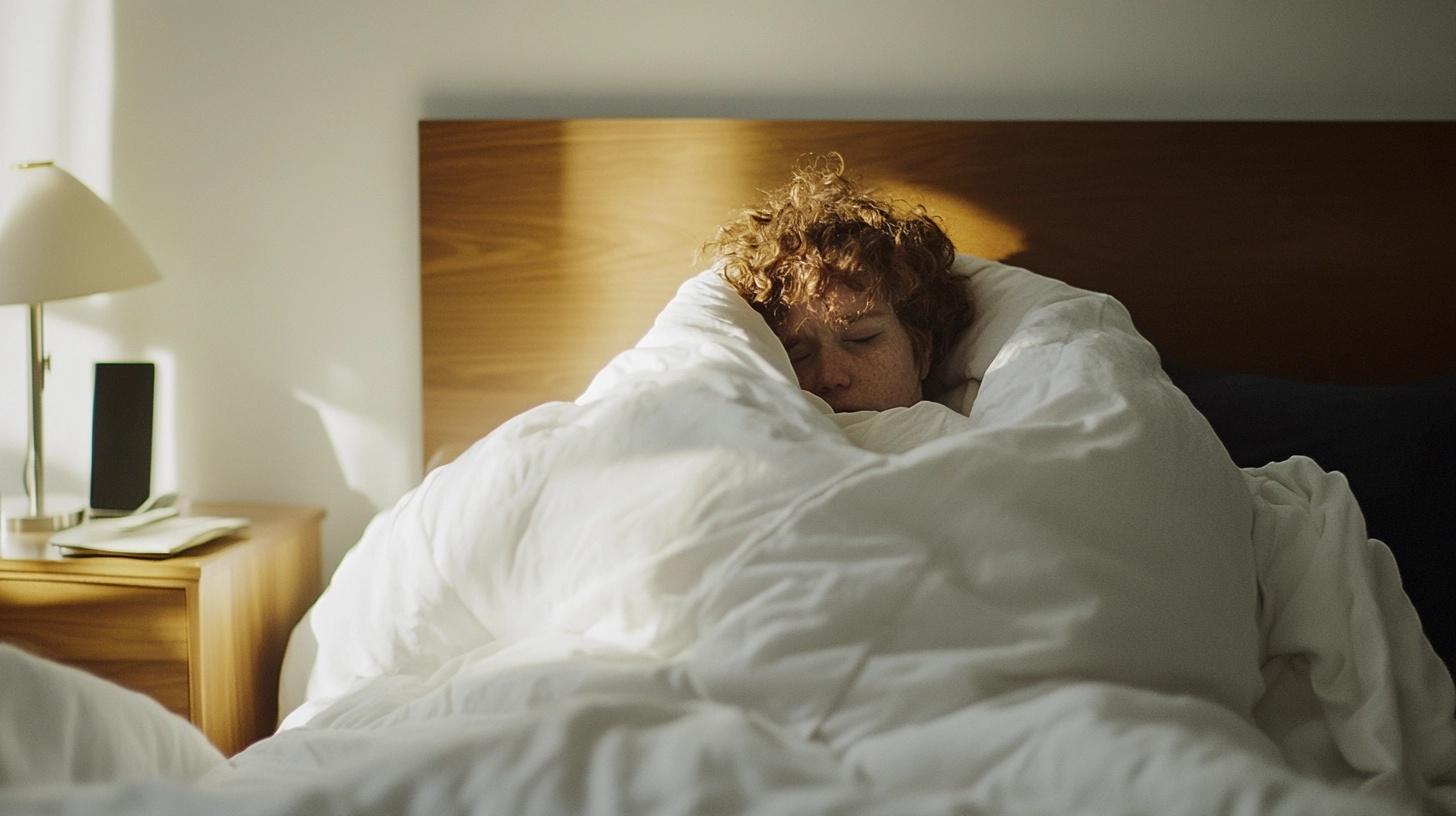Why do I wake up with a sore throat? 10 triggers and their remedies explained
Published

Waking up with a sore throat can be a frustrating and uncomfortable experience. It can make it difficult to talk, swallow, and even breathe comfortably. If you find yourself experiencing this problem on a regular basis, it’s important to understand the potential causes so you can take steps to prevent it from happening in the future. In this blog post, we’ll explore some of the most common reasons why you may be waking up with a sore throat, and we’ll guide you through some remedies for every specific culprit.
In this article, we’ll cover:
- Main factors that contribute to a drier throat at night
- 10 possible reasons you wake up with a sore throat
Main factors that contribute to a drier throat at night
One factor to keep in mind is that the body naturally produces less saliva during sleep. That’s because the parasympathetic nervous system, which is responsible for rest and digestion, is more active during this time and slows down the production of saliva as well as other functions such as heart rate and breathing. Additionally, when you are lying down, your head is often in a position that can obstruct the flow of saliva to the mouth, which can further decrease the production of saliva during sleep.
Mouth breathing is also frequent during the night and contributes to a drier mouth and less production of saliva, which results in sore throat in the morning. Moreover, you are more likely to inhale dust, pollen, and other pollutants that can irritate the throat, worsening the pain.
10 possible reasons you wake up with a sore throat
That being said, although the following triggers of your sore throat in the morning may not be serious from a medical standpoint, it’s important to identify and address them as they can negatively impact your sleep and overall daily function.
1. Dry air
Sleeping in a room with dry air can cause the mucous membranes in the throat to become dry and irritated, leading to a sore throat. This can be especially common during the winter months when heating systems are in use, or also in summer if you sleep with an AC on, which takes the moisture out of the air.
To prevent this, you can use a humidifier to moisturize the air in your bedroom, and keep the temperature in your room at a comfortable level. It is recommended to keep the indoor humidity around 30 to 50% to avoid mold growth, and at a temperature of 18 to 20 degrees Celsius (65-68 Fahrenheit). In the Sleep Cycle app, you can find these bedroom hacks and more to help you set up your optimal sleep environment for better sleep.
2. Dehydration
Dehydration can cause a dry mouth and throat during sleep, which can lead to a sore throat upon waking. One of the main causes of dehydration at night is not consuming enough water throughout the day or consuming salty foods or alcohol before bedtime. The decrease of saliva production during sleep doesn’t help it either, exacerbating the sore feeling in the throat. Furthermore, night sweats can also contribute to dehydration, so if you usually experience them, that sore throat in the morning could be linked to it.
Preventing dehydration is relatively straightforward: drink enough water during the day. Not only does staying hydrated promote good body function, but it also leads to better quality sleep. A study published in 2018 suggests a correlation between dehydration and shortened sleep duration, so make sure to maintain adequate water intake throughout the day. However, slow down the intake close to bedtime if you’re concerned about needing to use the bathroom during the night. Drink only when you feel thirsty and consider keeping a glass of water on your nightstand for easy access if needed.
3. Gastroesophageal reflux disease (GERD)
GERD, also known as acid reflux, is a condition in which stomach acid flows back into the esophagus, causing irritation and pain. This condition is often worse at night, leading to throat discomfort upon waking in the morning. Furthermore, GERD symptoms such as heartburn (chest pain), nausea, vomiting, and hoarseness can also disrupt sleep, leading to sleep deprivation or fragmented sleep. It’s important to note that lack of sleep can also be a trigger for GERD, creating a cyclical pattern of symptoms and disrupted sleep.
To stop this cyclical pattern of sore throat, symptoms and sleep deprivation, you can try first to introduce some changes into your diet: eat smaller meals, avoid foods that trigger your acid reflux (like spicy, fatty, salty meals and avoid caffeine and alcohol), and eat your dinner 2 or 3 hours before going to bed.
Another potential solution could also be to elevate the head of your bed by 10 centimeters (6-8 inches – use another pillow) so that the acid flows back into the stomach – but keep in mind an optimal neck position so you don’t wake up with a stiff neck or start snoring. And finally, ask your physician about taking over-the-counter medication, like antacids, in case that all these changes aren’t enough.
4. Postnasal drip
Postnasal drip can cause a sore throat in the morning because the mucus from the nasal passages can drain down the back of the throat during the night, leading to irritation and inflammation of the throat. This can make the throat feel scratchy and sore when you wake up in the morning. The accumulation of mucus can also cause a feeling of congestion and make it harder to breathe through the nose, leading to mouth breathing.
To effectively prevent postnasal drip, it’s important to first identify the underlying cause. Common triggers include allergies, colds, infections, and exposure to irritants such as smoke, perfumes, and pollution, so start first by evaluating your sleep environment, daily habits, and lifestyle. Staying hydrated and using a humidifier can help to thin out mucus and add moisture to the air, keeping the mucous membranes in the nose and throat from drying out.
Additionally, you can try using a saline nasal spray, which also aids in flushing out mucus and reducing congestion. Other preventative measures may also include elevating your head while sleeping, and avoiding eating heavy meals or acidic foods close to bedtime – they can cause acid reflux that can worsen postnasal drip symptoms at the same time.
5. Snoring and Sleep Apnea
Snoring is characterized by mouth breathing, which leads to a dry mouth and throat due to the constant airflow. Moreover, the vibration of the soft tissues in the throat and the back of the mouth that characterizes snoring can cause irritation and inflammation, leading to the feeling of scratchiness in the throat in the morning.
It’s also worth noting that snoring can also be a symptom of sleep apnea, which is a condition characterized by repeated episodes of partial or complete blockages of the airway during sleep. These blockages can cause the tissues in the throat to vibrate even more, leading to further irritation and inflammation. In fact, research suggests that a dry mouth in the morning can also be linked to sleep apnea, and therefore, should be considered in a potential sleep apnea diagnosis – together with excessive daytime sleepiness and high blood pressure among others.
Although the prevention and treatment of sore throat in the morning will depend on which breathing related issue you have, a good place to start is trying to change your sleep position. Sleeping on your side can help reduce both snoring and sleep apnea, as it encourages air and blood flow. Next, there are a couple of ways to stop snoring: natural remedies that you can try at home, and medical treatment if you present an extreme scenario. If you suspect you may be suffering from sleep apnea, always consult your options with your medical provider: from sleep habits and lifestyle changes to a CPAP machine.
6. Infections
Both viral and bacterial infections can be behind your sore throat upon waking. Upper respiratory tract infections (URTIs) are common causes and include the common cold, flu (both viral) and more serious infections such as strep throat, which is caused by the bacteria Streptococcus pyogenes.
When you have an infection, your body produces extra mucus in an attempt to flush out the germs. This extra mucus can cause the throat to feel dry, scratchy, and sore. You may also experience pain when talking or swallowing, and have a feeling of swelling in the throat. In addition, other symptoms associated with this type of infection may include fever, body aches, swollen lymph nodes, and coughing.
It’s important to note that a sore throat caused by a bacterial infection should be treated by a doctor, as antibiotics may be needed. Meanwhile, viral infections usually clear up after a few days with proper sleep and fluid intake: drinking hot drinks or gargling can relieve throat pain in the morning and during the day, and following a soft diet can make swallowing easier.
After the COVID pandemic, we all know that in order to prevent infections, it is essential to follow good hygiene, such as washing hands regularly and avoiding close contact with people who are sick.
7. Allergies
Allergies are well-known for disrupting sleep, making it difficult to fall or stay asleep because of a runny nose, coughing, itchy eyes and sore throat. In fact, when you’re exposed to an allergen (environmental or seasonal), your body produces histamine, which produces inflammation in the throat and other parts of the respiratory system. This inflammation can lead to a feeling of dryness, scratchiness, and soreness in the throat. As previously mentioned, allergies can also cause postnasal drip, which is when mucus from the sinuses flows down the back of the throat and creates irritation.
To relieve a sore throat caused by allergies, you can try:
- Avoiding the allergen, if possible, and keeping good personal hygiene.
- Using a humidifier to add moisture to the air, or an air purifier to filter most common allergens like dust, pollen or mold, especially in your bedroom. This will improve the air quality and help you reduce allergic reactions and sleep better.
- Using a saline nasal rinse to flush out allergens and mucus
- If it’s not possible to manage your symptoms, check with your doctor if you need to take over-the-counter antihistamines. However, keep in mind that they may worsen mouth dryness and cause insomnia.
8. Pollution
Exposure to pollutants such as smog, smoke, pesticides and dust can irritate the respiratory system and lead to inflammation in the throat and, consequently, to soreness, coughing and difficulty breathing. These symptoms may be more pronounced in the morning when the air is typically cooler and more still, allowing pollutants to accumulate and concentrate. If you suffer from asthma or have allergies, inhaling polluted air can also contribute to worsening the symptoms, having a bad night’s sleep and difficulty waking up.
Better air quality in your bedroom can help keep the pollution away while you sleep, at least: avoid smoking or the constant use of candles, and try to get optimal airflow by opening windows or also using an air purifying device.
9. Smoking
Yes – the chemicals and pollutants in cigarette smoke can also dry out your throat and other parts of the respiratory system. When you smoke, the smoke enters your lungs and can cause irritation and inflammation of the airways, which can lead to a sore throat, coughing, difficulty breathing and other upper respiratory tract issues. All these can make it harder to sleep and intensify the discomfort in the morning. Furthermore, smoking can also dry out the mucous membrane of the throat and make it more vulnerable to infections.
As you could have guessed, the most effective way to prevent and relieve a sore throat is to quit smoking. Introducing healthier lifestyle habits, drinking plenty of water to keep the throat hydrated and keeping the air from your bedroom cleaner are the first steps to become smoke free for a better overall health.
10. Talking more than usual or too loudly
Have you ever woken up with a sore throat the day after spending a whole concert singing along, or giving a long speech at work? Yes – using your voice excessively, for too long or too loudly, can put a strain on the muscles and tissues in the throat, which also leads to inflammation and irritation in the vocal cords. As a result, you might sound hoarse and experience some discomfort in the area upon waking.
One of the most effective ways to alleviate a sore throat caused by excessive talking or talking too loudly is to give your voice some rest. This can be achieved by speaking at a moderate volume and taking breaks when talking for prolonged periods of time, especially if your job requires frequent use of your voice. Drinking plenty of water to keep your throat hydrated can also help to relieve soreness. In addition, avoiding clearing your throat can also help to reduce irritation and inflammation in the throat. With these steps, you will likely notice an improvement in the soreness and a return to normal vocal function throughout the day.
Say goodbye to morning sore throat: remedies for a comfortable day and good night’s sleep
A sore throat in the morning can be caused by a variety of factors and isn’t usually a health issue to be concerned about. Natural and home remedies can help you relieve the discomfort, sleep better and feel better within a few days. However, if the soreness lasts longer than a week, you should consult your healthcare provider for a more thorough check to find out the underlying cause.
Besides this, if you need additional guidance on how to improve your bedroom for better sleep and wake up without a sore throat, the sleep programs in the Sleep Cycle app can help you achieve your optimal sleep environment and find those habits you need to include both in your night and morning routine.






